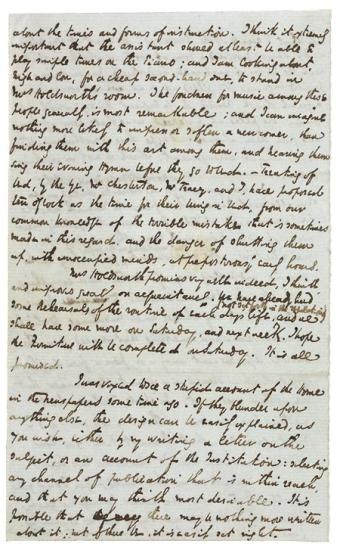
Autograph letter signed, London, 3 November 1847, to Angela Burdett-Coutts
Purchased with the assistance of the Fellows, 1951
Dickens's letters to Burdett-Coutts are, by any standard, extremely long and detailed and reveal his extraordinarily competent administrative abilities as well as shrewd insight into the minds and motivations of the women who would enter Urania Cottage. He insisted "that their past lives should never be referred to." He also recognized "that these unfortunate creatures are to be tempted to virtue. They cannot be dragged, driven, or frightened." Dickens's meticulous attention to detail is apparent in this letter, in which he informs Burdett-Coutts that "I have laid in all the dresses and linen of every sort for the whole house... I have made them as cheerful in appearance as they reasonably could be—at the same time very neat and modest."
Philanthropy
From 1840 Dickens guided the charitable work of philanthropist Angela Burdett-Coutts (1814–1906), the wealthiest heiress in Victorian Britain. Dickens served as her official almoner and helped to assess the merits of the thousands of letters she received from those seeking financial assistance. He also advised on her plan for improved sanitation in the slums of Westminster and drew her attention and support to the Ragged School Union, which provided education to London's poorest children. A pragmatist, Dickens encouraged Burdett-Coutts to direct her philanthropy toward the causes of distress. In 1847 they founded a home, Urania Cottage, in Shepherd's Bush, as a shelter for homeless women—prostitutes or petty criminals who sought to rehabilitate themselves by learning practical skills and developing self-discipline. Many of the women were assisted to eventually emigrate to one of Britain's colonies to begin a new life. For more than ten years, Dickens administered Urania Cottage on behalf of Burdett-Coutts and played an extremely active role in its day-to-day management.
about the times and forms of instruction. I think it extremely important that the assistant should at least be able to play simple tunes on the Piano; and I am looking about, high and low, for a cheap second-hand one, to stand in Mrs. Holdsworth's room. The fondness for music among these people generally, is most remarkable; and I can imagine nothing more likely to impress or soften a new comer, than finding them with this art among them, and hearing them sing their Evening Hymn before they go to bed. Treating of bed, by the bye, Mr. Chesterton, Mr. Tracey, and I, have proposed ten o'Clock as the time for their being in bed, from our common knowledge of the terrible mistake that is sometimes made in this regard, and the danger of shutting them up, with unoccupied minds, at preposterously early hours.
Mrs. Holdsworth promises very well indeed, I think, and improves greatly on acquaintance. We have already had some Rehearsals of the routine of each day's life, (not set forth in the regulations) and we shall have some more on Saturday, and next week. I hope the Furniture will be completed on Saturday. It is all promised.
I was vexed to see a stupid account of the Home in the Newspapers some time ago. If they blunder upon anything else, the design can be easily explained, as you wish, either by my writing a letter on the subject, or an account of the Institution: selecting any channel of publication that is within reach, and that you may think most desirable. It is possible that there may be nothing more written about it: but if there be, it is easily set right.
